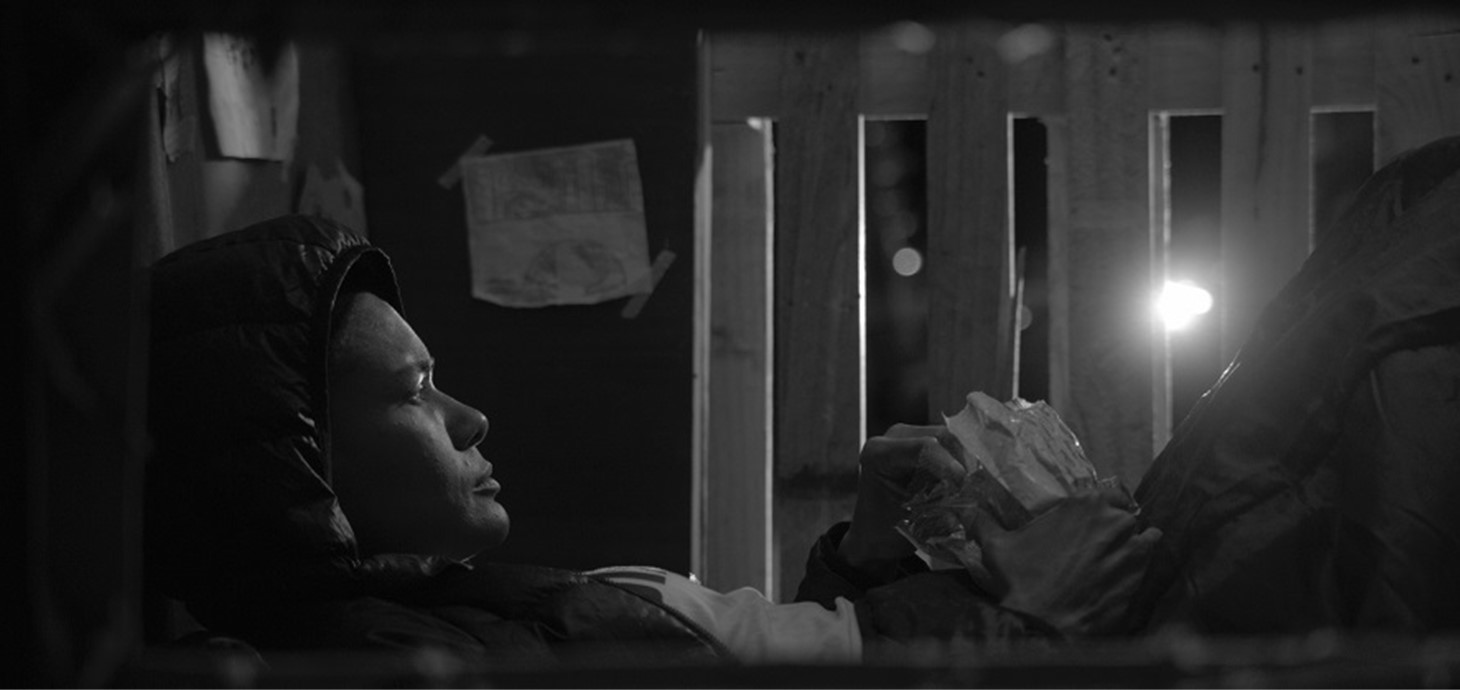
A scene from the Spanish/Welsh film Dystopia, inspired by the real-life stories of refugees in Swansea. The film tells the story of an African woman refugee in Valencia, whose home is a plastic tent under a bridge.
A film showing the difficulties faced by an African refugee in Spain, which was inspired by the real-life stories of refugees in Swansea, has been shown in the city’s Grand Theatre to an audience that included some of the people whose stories were used.
“Dystopia” is a film by Spanish director Samuel Sebastian, co-produced by Professor Sergei Shubin of Swansea University, head of the Centre for Migration Policy Research.
The film has already been shown in Italy, Spain and Bulgaria, attracting publicity in those countries, though it has a strong Welsh dimension, with its music produced by a Welsh composer, subtitles in Welsh and part of its post-production completed by the Welsh company Telesgop.
The screening in Swansea was the first time the film had been shown in Wales. The event, which formed part of the Festival of Social Science, was co-organised by Kristina Krasnova, supported by Harrison Rees and people from refugee backgrounds. The screening was followed by a discussion with director Samuel Sebastian.
“Dystopia” tells the story of an African woman refugee in the Spanish city of Valencia as the city celebrates the Fallas festival. Her home is a plastic tent under a bridge, and the film chronicles her daily life, the dangers she faces and the friendships she makes, for example with a fellow refugee from Latin America.
Although the film is set in Spain, the story is based on the interviews and drawings produced by some of the people seeking asylum in Swansea.
One of those is Carlos, an asylum seeker from Venezuela now living in Swansea. His life is full of emotional suffering and fear of deportation, and it resonates with the trials of the main character in “Dystopia”.
Amina, who escaped Iran fearing prosecution, describes her sense of disorientation in the unfamiliar environment of Wales.
The film reflects these themes, as well as others emerging from the migrants’ stories, such as uncertainty, anxiety, loss and isolation.
Some of the people whose stories inspired the film were in the audience for the screening.
Samuel Sebastian, the director of the film, who took part in the post-event discussion, said:
“I was really taken by the conversation with the refugees and asylum seekers in Swansea, who attended the film screening. I thanked them for sharing the difficult stories of their migration and settlement. This film screening and the following discussion was one of the most moving and interesting Q&A I have ever taken part in because of the diversity of the testimonies and the profound honesty of them.”
Professor Sergei Shubin, Director of the Centre of Migration Policy Research at Swansea University, who co-produced the film, said:
“Inspired by these true stories, the film portrays a migrant journey that is always incomplete and riddled with uncertainty, with migrants unable to work or choose a place to live and facing an unpredictable future.
The film translates research findings into a format that makes them accessible to broader audiences, helping to develop understanding of migration issues beyond their original cultural context.
The event is also in line with Swansea University’s commitment to promote equality, diversity and inclusion, to expand its civic mission work in the local community, and with its bid to become the University of Sanctuary.”
The film screening was supported/funded by the EU Horizon2020 project PERCEPTIONS (grant agreement 833870). It was shown as part of the Festival of Social Science, which featured free events for the public across Swansea. The Festival is an annual celebration of research and knowledge about humans and society, with events run by researchers from UK universities.
